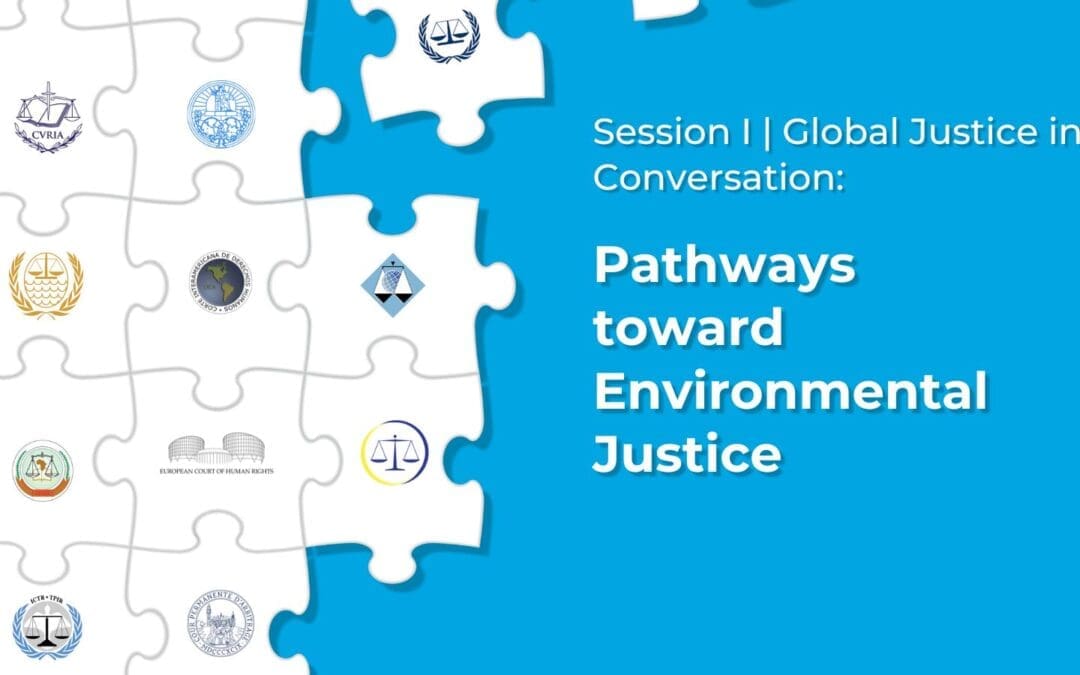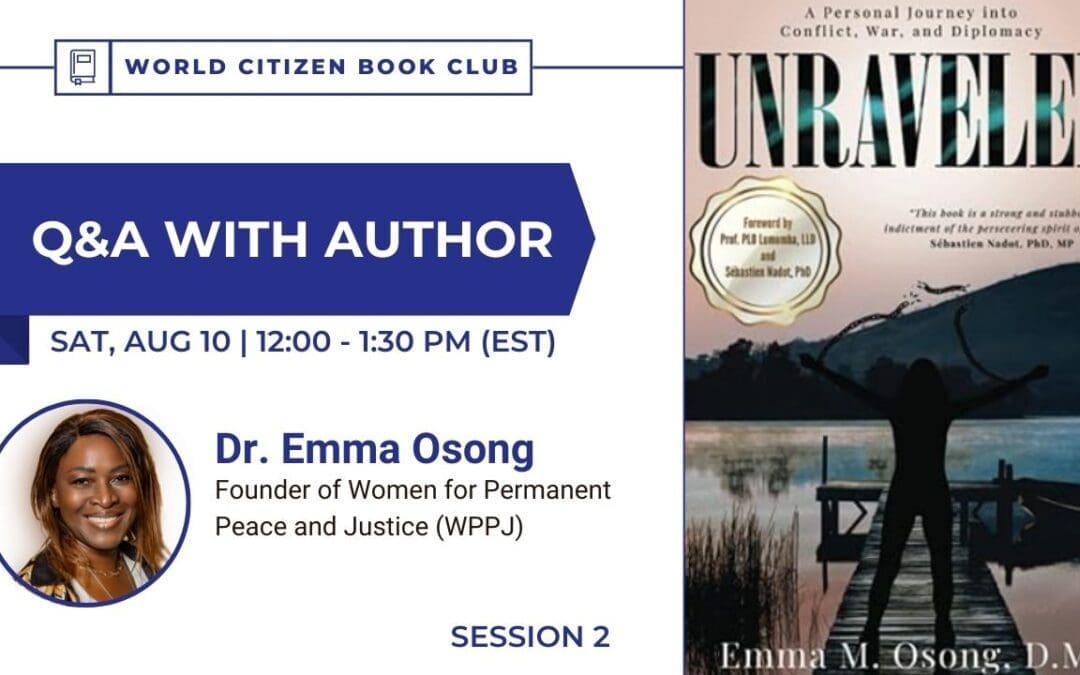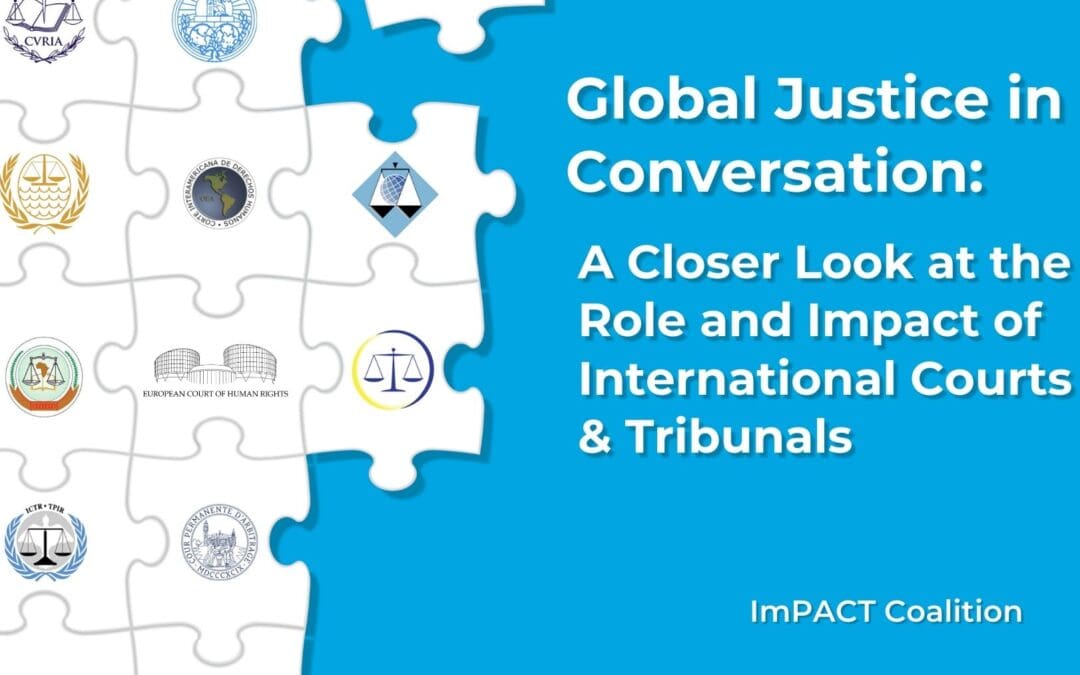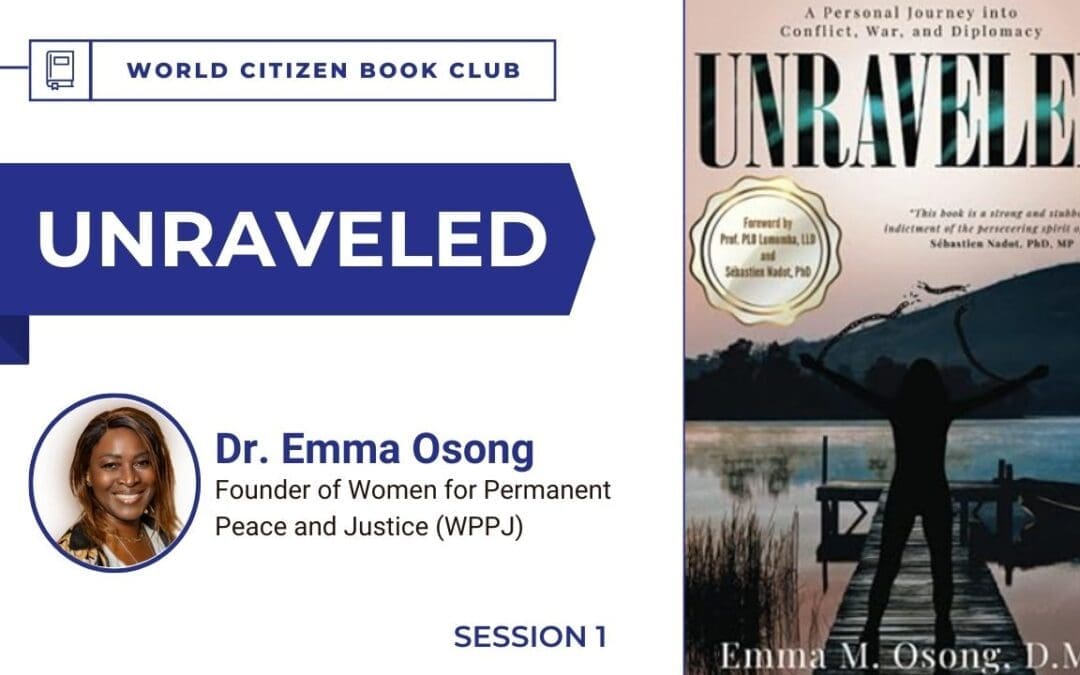
by CGS | Aug 21, 2024 | Past Event
The ImPACT Coalition on Just Institutions and the International Court of Justice (ICJ) hosted two webinars in cooperation with the ImPACT Coalition on Earth Governance exploring judicial pathways toward environmental justice. The ImPACT Coalitions were established as part of a civil society-led complement to the UN Summit of the Future process and tackle a diverse array of global governance issues.
To date, the ImPACT Coalition on Just Institutions and the ICJ has convened three webinars to raise greater awareness of the roles, successes, and interaction among international judicial institutions, and to support advocacy toward their greater universality and effectiveness.
This webinar addresses environmental justice issues. There is widespread recognition that the world faces a moment of profound environmental crisis. And yet, the existential nature of this threat may give a false impression that actors responsible cannot be identified or are beyond the arm of global justice. Recent years have seen hopeful developments in the attempt to achieve accountability for heinous harms to humanity and the planet.
These include: The advancement of both requests for Advisory Opinions and contentious cases on State responsibility for environmental degradation, including climate change, before the ICJ and International Tribunal for the Law of the Sea (ITLOS); Support for a new Crime of Ecocide to be included by amendment within the Rome Statute of the International Criminal Court (ICC), including a robust report by an independent expert panel, as well as the promulgation of a policy by the current Prosecutor to actively investigate and prosecute environmental crimes within the Court’s current jurisdiction; Seminal precedential rulings at the regional level, including the Inter-American Court and European Court systems; The historic completion of reparations payments after more than three decades, including for environmental damage, for the illegal invasion by Iraq of Kuwait in 1990; and Introduction of proposals for new judicial institutions with distinct subject matter jurisdiction capable of addressing the multifaceted and intersectional challenges of environmental crimes, including an International Environmental Court and International Anti-Corruption Court (IACC).
At the same time, experiments like a widely critiqued ICJ Environmental Chamber, active from 1993-1996, provide cautionary tales. This webinar, organized by Citizens for Global Solutions (CGS), with the Raoul Wallenberg Institute of Human Rights and Humanitarian Law, and the World Federalist Movement-Institute for Global Policy (WFM-IGP), probes potential pathways to environmental justice in international and regional courts and tribunals.

by CGS | Aug 10, 2024 | Past Event
Watch Session II with author, Dr. Emma Osong, and special Q&A; where we discussed her book, Unraveled: A Personal Journey into Conflict, War, and Diplomacy.
Dr. Emma’s book called the “Unraveled” where two worlds collide in this emotional journey provides a blueprint on how to promote peace and justice amid times of war. Emma Osong’s world was turned upside down when her daughter Praxie was told she would never walk again. Faced with the traumatic circumstances of her daughter’s condition, Osong draws comparisons between her daughter and her war-ravaged country of origin, Cameroon. Detailing the events in Cameroon and the struggles of its people trapped in decades of tyranny, Osong interweaves the history of a war-torn country with threads of a personal conflict.
Dr. Emma Osong is founder of Women for Permanent Peace and Justice (WPPJ). Emma has celebrated an extensive career in speaking, engineering, peacebuilding, and leadership. Speaking engagements include appearances on Voice of America (VOA), Equinox TV, ABC, and several podcasts and international conferences. As an accomplished aerospace systems engineer, she brings an informative and crucial voice to STE’A’M topics, encouraging young women in underdeveloped and developing countries to explore career paths within STEM fields. Emma’s goal is to create a world where women, men, and children all have the right to live dignified life.
For more information on current CGS World Citizen Book Club Sessions visit our CGS Book Club page.

by CGS | Jul 18, 2024 | Past Event
The International Day of Justice, July 17, commemorates the day in 1998 when the Rome Statute was adopted establishing the International Criminal Court (ICC). Today, the ICC forms an integral piece of a complex and complementary global judicial architecture, joining treaty-based tribunals, regional institutions, and alternative methods of dispute resolution. At the heart of this framework is the International Court of Justice (ICJ), which was established in 1945 as one of the principal organs of the United Nations, and primary means for the pacific resolution of disputes between states.
This International Justice Week, watch Session I of the inaugural webinars in a series intended to take a closer look at these institutions and how they can effectively complement one another and domestic judicial systems.
Session II: In this session, we focused on the ongoing situations and cases where multiple international pathways to justice are concurrent, including the ICJ and other judicial institutions. This session considers how these mechanisms can be complementary and probe what more must be done to realize the promise of an end to impunity.
Speakers:
H.E. Corinne Cicéron Bühler, Ambassador of Switzerland to The Netherlands.
Prof. Jennifer Trahan, Clinical Professor, Center for Global Affairs, NYU.
Arie Mora, Advocacy and Communications Manager at the Ukrainian Legal Advisory Group (ULAG).
Dr. Habib Ullah, Convening Council Member of Congress of Nations and States General Secretary of Arakan Rohingya National Organisation (ARNO).
Neshan Gunasekera, Visiting Fellow, Raoul Wallenberg Institute of Human Rights.

by CGS | Jul 18, 2024 | Past Event
The International Day of Justice, July 17, commemorates the day in 1998 when the Rome Statute was adopted establishing the International Criminal Court (ICC). Today, the ICC forms an integral piece of a complex and complementary global judicial architecture, joining treaty-based tribunals, regional institutions, and alternative methods of dispute resolution. At the heart of this framework is the International Court of Justice (ICJ), which was established in 1945 as one of the principal organs of the United Nations, and primary means for the pacific resolution of disputes between states.
This International Justice Week, watch Session I of the inaugural webinars in a series intended to take a closer look at these institutions and how they can effectively complement one another and domestic judicial systems.
In this session, we discussed Nuclear Nonproliferation and Disarmament: Lessons from the Asia-Pacific Region discussed how we will highlight the important role of the ICJ, why it has a surprisingly high success rate with regard to disputes that it adjudicates, examples of a few of the success stories of the Court and why all countries should move to accepting its compulsory jurisdiction.
Speakers:
Hon. Matt Robson (New Zealand). President, Aotearoa (NZ) Lawyers for Peace. Former parliamentarian with positions of Minister for Courts and Minister for Disarmament and Arms Control.
Dr. Penelope Ridings (New Zealand), Member of the International Law Commission.
Luis Roberto Zamora Bolaños (Costa Rica), Board Member, International Association of Lawyers Against Nuclear Arms. Human & Civil Rights Lawyer.

by CGS | Jul 13, 2024 | Past Event
Watch Session I with author, Dr. Emma Osong, and special Q&A; where we discussed her book, Unraveled: A Personal Journey into Conflict, War, and Diplomacy.
Dr. Emma’s new book called the “Unraveled” where two worlds collide in this emotional journey provides a blueprint on how to promote peace and justice amid times of war. Emma Osong’s world was turned upside down when her daughter Praxie was told she would never walk again. Faced with the traumatic circumstances of her daughter’s condition, Osong draws comparisons between her daughter and her war-ravaged country of origin, Cameroon. Detailing the events in Cameroon and the struggles of its people trapped in decades of tyranny, Osong interweaves the history of a war-torn country with threads of a personal conflict.
Dr. Emma Osong is founder of Women for Permanent Peace and Justice (WPPJ). Emma has celebrated an extensive career in speaking, engineering, peacebuilding, and leadership. Speaking engagements include appearances on Voice of America (VOA), Equinox TV, ABC, and several podcasts and international conferences. As an accomplished aerospace systems engineer, she brings an informative and crucial voice to STE’A’M topics, encouraging young women in underdeveloped and developing countries to explore career paths within STEM fields. Emma’s goal is to create a world where women, men, and children all have the right to live dignified life.
For more information on current CGS World Citizen Book Club Sessions visit our CGS Book Club page.






























